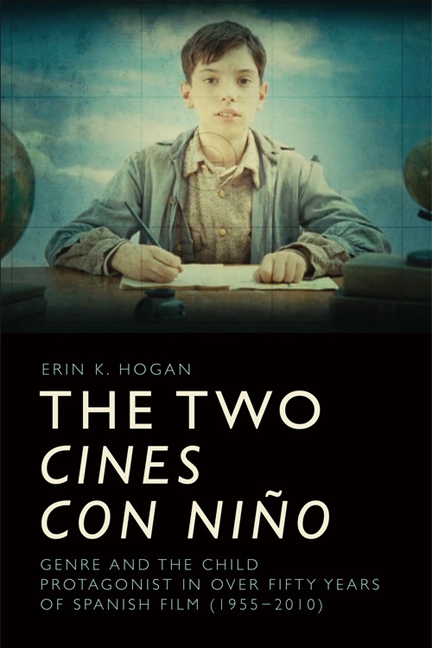Book contents
- Frontmatter
- Contents
- List of Figures
- Acknowledgements
- Figure Permissions
- Introduction The Two Cines Con Niño: The Ventriloquism, Dialogism and Biopolitics of the Children of Franco in Genre Film
- 1 The Black Market and the Stolen Children of Franco in Demonios En El Jardín
- 2 The Appropriative and Carnivalesque Ventriloquism of Altar Boys from Joselito in El pequeño ruiseñor to Ignacio in La mala Educación
- 3 Ventriloquism, Kidnapping and the Carnivalesque in Marisol’s Tómbola
- 4 Adopting, Adapting and Appropriating in the cines con niño: Un rayo de luz and El viaje de Carol
- 5 Prosopopeia and the Gothic Child from Marcelino pan y vino to El Orfanato
- 6 Dialogism and Ritual Function of the Nuevo Cine Con Niño: El Espíritu De La Colmena, Secretos Del Corazón And El Laberinto Del Fauno
- 7 Queering Post-war Childhood in Urte Ilunak and Pa Negre
- 8 The Transatlantic Dialogism in Narrative and Aesthetics of Bildungsfilms: La Lengua De Las Mariposas, Machuca, El Espíritu De La Colmena, El Premio, El Laberinto Del Fauno And Infancia Clandestina
- Conclusion Spanish Movies: Genre, Nation and Spanish Movie
- Select Filmography
- Select Bibliography
- Index
6 - Dialogism and Ritual Function of the Nuevo Cine Con Niño: El Espíritu De La Colmena, Secretos Del Corazón And El Laberinto Del Fauno
Published online by Cambridge University Press: 01 May 2021
- Frontmatter
- Contents
- List of Figures
- Acknowledgements
- Figure Permissions
- Introduction The Two Cines Con Niño: The Ventriloquism, Dialogism and Biopolitics of the Children of Franco in Genre Film
- 1 The Black Market and the Stolen Children of Franco in Demonios En El Jardín
- 2 The Appropriative and Carnivalesque Ventriloquism of Altar Boys from Joselito in El pequeño ruiseñor to Ignacio in La mala Educación
- 3 Ventriloquism, Kidnapping and the Carnivalesque in Marisol’s Tómbola
- 4 Adopting, Adapting and Appropriating in the cines con niño: Un rayo de luz and El viaje de Carol
- 5 Prosopopeia and the Gothic Child from Marcelino pan y vino to El Orfanato
- 6 Dialogism and Ritual Function of the Nuevo Cine Con Niño: El Espíritu De La Colmena, Secretos Del Corazón And El Laberinto Del Fauno
- 7 Queering Post-war Childhood in Urte Ilunak and Pa Negre
- 8 The Transatlantic Dialogism in Narrative and Aesthetics of Bildungsfilms: La Lengua De Las Mariposas, Machuca, El Espíritu De La Colmena, El Premio, El Laberinto Del Fauno And Infancia Clandestina
- Conclusion Spanish Movies: Genre, Nation and Spanish Movie
- Select Filmography
- Select Bibliography
- Index
Summary
Introduction
The nuevo cine con niño often exhibits the ritual function of genre cinema. In Chapter Five, I examined the dialogism of the Gothic child across these films. I will examine broader kinship of the three films, specifically with regard to their imaginative child protagonists. In the current chapter, I analyse dialogism and the ritual function in a selection of three intricately linked films: El espíritu de la colmena (The Spirit of the Beehive) (Erice 1973) from the early transition to democracy, Secretos del corazón (Secrets of the Heart) (Armendáriz 1997) released during José María Aznar's conservative administration (1996–2004), and El laberinto del fauno (Pan's Labyrinth) (Del Toro 2006) corresponding to José Luis Zapatero's socialist government (2004–11). I am able to reveal the nuevo cine con niño as a genre-in-the-making with the imaginative alternatives to Francoism and its cine con niño that their respective historical contexts allow. These films fuse the ritual function of genre and the child's rite of passage, resting on the protagonist's liminality and ability to envision new possibilities. In historian Edward Muir's summary of the rites of passage in early modern Europe, he reviews three rites that remain relevant for our twentieth and twenty-first century child protagonists: (1) the preliminary rite of separation; (2) the liminary rite of transition that ‘temporarily suspend[s] the subject betwixt and between his or her old and new state, providing an experience of the sacred or a utopian vision of an alternative social world’; and (3) the postliminary rite of aggregation or incorporation ‘which bring the person into the embrace of the new community’ (2005: 21). In the nuevo cine con niño, child protagonists embark upon rites of passage that do not simply convey them towards a generalised, biologically mature adulthood but rather into a certain political community of adults. Numerous nuevo cine con niño films, like Secretos del corazón (Armendáriz 1997), La lengua de las mariposas (Cuerda 1999), and El viaje de Carol (Uribe 2002), express the liminality, limen meaning threshold, of their child protagonists through the visual motif of crossing rivers and bridges to reach a new adult world. This is the community of Republicans, Francoist dissidents, or other outcasts of the dictatorship in the nuevo cine con niño's political coming-of-age narratives.
- Type
- Chapter
- Information
- The Two cines con niñoGenre and the Child Protagonist in Fifty Years of Spanish Film (1955–2010), pp. 128 - 140Publisher: Edinburgh University PressPrint publication year: 2018



